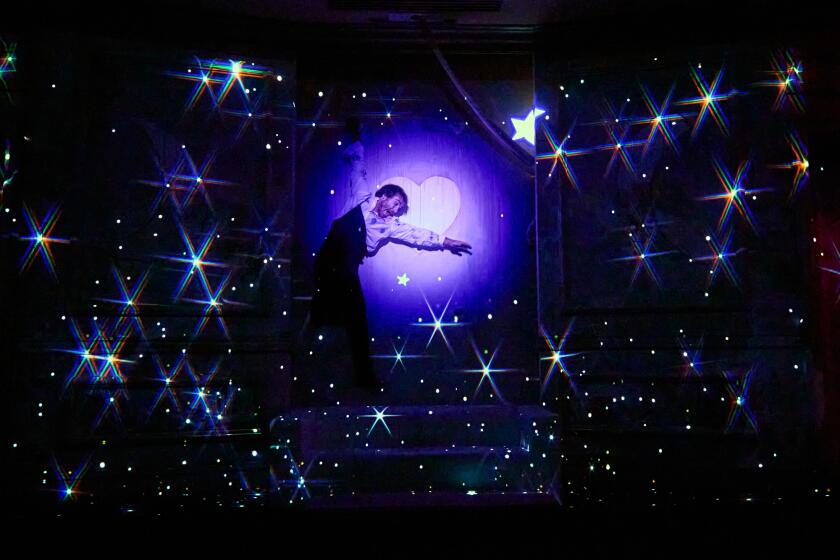MUSIC : Bass-Baritone Has Roots in Science : John Shirley-Quirk, who will sing at the Pacific Symphony ‘Royal Gala’ concert, did not initially intend to make music his life.
In the case of bass-baritone John Shirley-Quirk, science’s loss was music’s gain. Born in Liverpool in 1931, Shirley-Quirk began his professional career as a chemistry teacher, first at a technical college in England and later in the British air force.
But all along, friends who heard him sing urged him to try that as a career instead, and when composer Benjamin Britten heard him in the early 1960s, he picked Shirley-Quirk to create a series of roles in such works as “Curlew River,” “The Burning Fiery Furnace,” “The Prodigal Son” and “Death in Venice.”
Thus was a major career born.
Shirley-Quirk, who will be singing at the Pacific Symphony “Royal Gala” concert Saturday at the Orange County Performing Arts Center, says he’s “very glad” of his scientific background.
“But sadly,” he added between rehearsals at the Metropolitan Opera in New York, where he will be singing Rangoni in Mussorgsky’s “Boris Godounov” the night before he sings in Costa Mesa, “I can’t even understand my 8-year-old’s science anymore. . . . Science has changed, and I have changed.”
He recalls that the career shift was difficult.
“It took me a long time to allow the other side (of the brain)--I never know which side is which--as free a range as the more scientific side,” he said. “I approached music in a very much--I won’t say clinical fashion, that can’t have been the case--but in a punctilious fashion. And it took me a long time before I allowed myself the necessary freedom of expression that must be present in music to take its rightful place.”
Although he got a late start professionally, music was not new to him.
“Music was always there, all my life,” he said. “I can’t remember a moment when it wasn’t there. I started singing at the age of 9 in a church choir. That was my basic musical training until I got to the university.”
But working with Britten was, he said, the “most stimulating experience of my life.
“To work with a pair of musicians, Britten and (his long-term companion, tenor Peter) Pears together, I think that was my real music school, just absorbing their ideas of musicianship and dedication that are necessary to make the work a success.”
With the Pacific, Shirley-Quirk will sing works by Mozart and Ralph Vaughan Williams, and with actress Lynn Redgrave he will narrate William Walton’s “Facade.”
Walton composed “Facade” in 1921 in collaboration with poet Edith Sitwell, as a little “entertainment” to be given at one of the soirees held at the home of Sitwell’s brothers, Osbert and Sacheverell.
The stylish and quirky work, scored for a speaker declaiming Sitwell’s experimental poems against instrumental accompaniment, survived its hothouse origins to become one of Walton’s most popular pieces.
“I’ve never done ‘Facade’ before,” Shirley-Quirk said. “It’s a new adventure. It’s not easy. It’s very, very fast and patter-full. . . . I’m moderately used to narrating in public, although the balances are totally different when you’re speaking and when you’re singing.
“When you sing, you spend more time on a note, and therefore it penetrates an orchestral texture better. When you speak, everything is much more staccato and short. You have a much greater problem in getting through an orchestral texture. The Walton is scored for a fairly small orchestra, which does not necessarily mean that it’s easy to penetrate.
“I sometimes need--and suspect I will need in Costa Mesa--amplification for the speaking part. But not for the singing parts.
“There’s a lot of wonderful British music,” he added. “Very early on, I got associated with that, and I’m happy to have been associated with that, particularly with the works of (Benjamin) Britten. But I don’t regard myself as a British specialist anymore. I think more I would regard myself as a lieder specialist, if I had to put a label on myself, which I would hate to have to do.”
Shirley-Quirk allows that English “is very difficult to sing. The problem is that first, consonants are relatively soft in English and the vowels are diphthongs. So every vowel has to be molded as you go along through a note. It’s not enough to get onto a vowel and hold it to the last minute, as it would be in other languages. You have to guide it constantly, and you have to be listening very hard to yourself all the time to make sure what you’re producing is making English sense and making musical sense.
“Sadly, a lot of young singers have gone to Italian coaches or German coaches and learned how to sing Italian, learned to sing German or how to sing French. Rarely have they gone to anybody to teach them to sing English, assuming that just because they are English themselves, that gives them the right to sing it.
“No one would dream of going on stage and speaking Shakespeare without studying how to speak English. But there are English singers who go on stage and perpetrate all sorts of monstrosities. They have a British passport. But that’s not good enough, really. It’s a subject--a language, a technique--that has to be studied.”
John Shirley-Quirk will sing with the Pacific Symphony during its “Royal Gala” concert Saturday at 7 p.m. at the Orange County Performing Arts Center, 600 Town Center Drive in Costa Mesa. Tickets: $35, $55, $75 for the concert; $250 and $500 for the concert and a post-concert dinner. Information: (714) 556-2787. The concert will be part of the Orange County Festival of Britain, a combination arts festival and retail promotion.
More to Read
The biggest entertainment stories
Get our big stories about Hollywood, film, television, music, arts, culture and more right in your inbox as soon as they publish.
You may occasionally receive promotional content from the Los Angeles Times.






